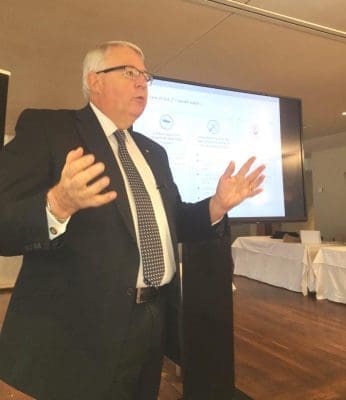UP TO four commercial trials in different processing applications across northern and southern Australia might be necessary before the red meat industry commits serious funds to the installation of DEXA objective carcase yield measurement technology.

EY’s independent review team leader Andrew Metcalfe outlines findings from yesterday’s second issues paper
That is one of the signals to emerge from a second issues paper released yesterday as part of an independent review of Meat & Livestock Australia’s proposed investment in DEXA technology.
The paper, compiled by consultants EY (formerly Ernst & Young) raises key issues for further industry comment on whether DEXA represents an appropriate operational and commercial decision for red meat industry participants.
Teys Australia will shortly be installing a DEXA X-ray scanning system for commercial pilot trial in its Lakes Creek beef plant near Rockhampton (see full story tomorrow), but the EY issues paper suggests further trials should be considered in different processing applications.
EY engaged with a cross section of industry bodies, producers, processors in forming conclusions outlined in the report.
“Both producer and processors want to see pilot programs using DEXA conducted before any significant capital is invested,” the issues paper says. “They want to see if the technology actually works for the industry, on many fronts. They expect any business case to be well-supported by pilots, trials and data,” the report said.
Several processors interviewed indicated a willingness to conduct pilot programs at their facilities.”
The issues paper suggests that the broader industry is more aligned than it is divided on DEXA technology and its future potential role.
Further stakeholder feedback will be sought on the key issues identified before the final report is issued around the end of May.
Last November, MLA managing director Richard Norton surprised many across the industry when he announced an ambitious plan called Project 150, to establish Dual Energy X-Ray Absorptiometry technology to assess carcase yield in up to 90 Ausmeat accredited beef plant in Australia, at an estimated cost of $150 million by 2020 (click here to view original story).
In February, the Australian Meat Processor Corporation and Australian Meat Industry Council appointed consultants EY to undertake an independent review into the introduction of objective carcase measurement technology and its application in the red meat processing industry.
The second Issues Paper has been developed after engagement with a wide range of industry stakeholders including producers and processors, both large and small, various peak industry councils, providers of OCM technology and other interested parties.
It suggests that early engagement with both producers and processors on the industry proposal may be ‘out of sync’ with the way producers and processors go about their own business decision making.
Six key issues have emerged from the qualitative research among both producers and processors:
- Carcase grading and pricing has been an ongoing source of frustration to producers in over-the-hooks sales to processors.
- OCM and related technologies are seen by producers as much-needed tools to increase the objectivity and transparency of carcase measurement.
- While processors are concerned that DEXA technology is only a quantitative assessment which may lead to producers pursuing a ‘yield over quality’ approach and suggest that producers are already well educated in the importance of meat quality factors.
- Confidence that DEXA technology may deliver suggested industry developments is only moderate among both producers and processors.
- Producers and processors both view capital investment (like that in DEXA technology) as a means to deliver their own business strategy and to activate their business model, and should not be government intervened.
- Almost all producers and processors are concerned about the application of DEXA technology in beef which is still being trialled, and are calling for pilot programs to generate reliable empirical data to take place before significant industry expenditure is undertaken, as a more prudent approach than suggested.

Peter Noble
AMPC chairman Peter Noble said his organisation and the Australian Meat Industry Council supported the introduction of proven carcase measurement technology, delivering tangible benefits for members and the industry.
He said EY’s second issues paper outlined the key issues for the industry’s consideration, and he encouraged the wider industry to provide input into the questions raised in the document.
“We then look forward to EY’s final report,” Mr Noble said.
EY’s independent review team leader Andrew Metcalfe said there had been a good level of engagement from the industry during the study. He welcomed feedback on the second Issues Paper and encouraged more stakeholders to come forward and contribute to the process.
The final review will provide analysis and recommendations on whether investment in DEXA technology is a prudent operational and commercial decision for processors. The review will evaluate all strategic, technical, financial, commercial, operational, governance, and implementation aspects of Project 150.
- Click here to access the full version of EY’s second issues paper.
- EY is seeking industry feedback on the issues paper, by 12 May. The final EY independent report will be published later this month.
